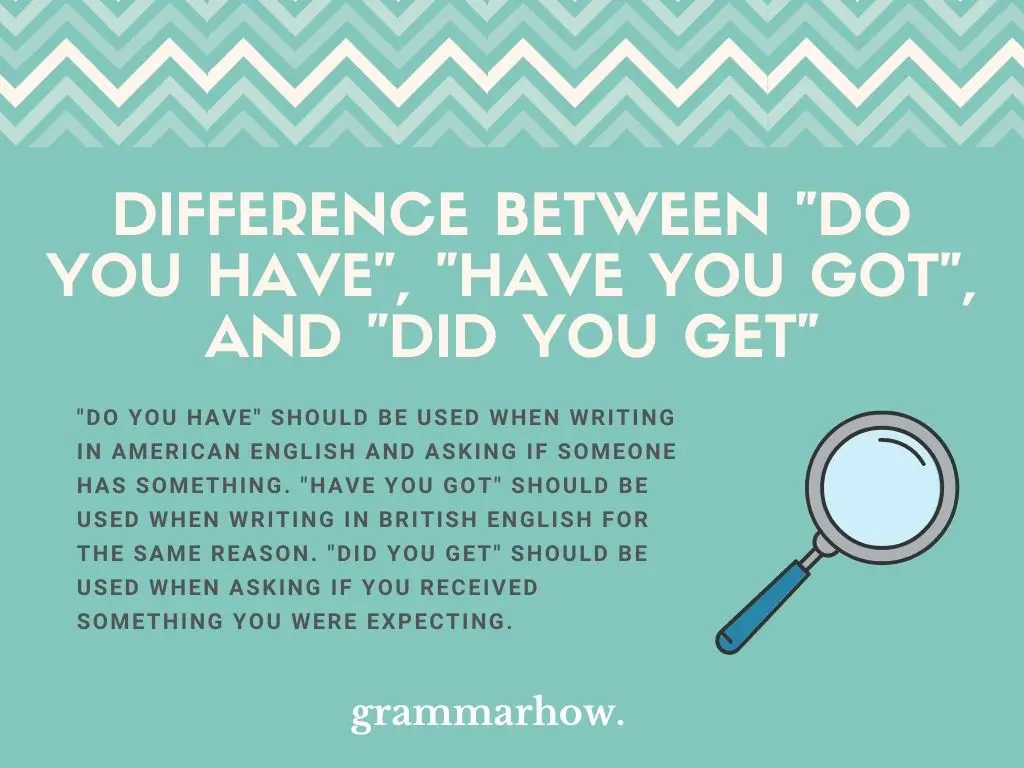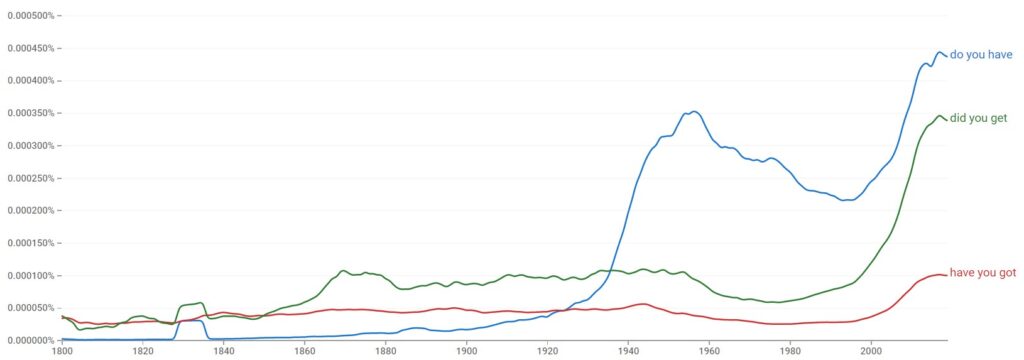When we use auxiliary (helping) verbs before certain phrases like asking if someone has something (“do you have” or “have you got”), it’s important to understand the rules. In this article, we’ll explore the differences between three seemingly similar phrases.
What Is The Difference Between “Do You Have,” “Have You Got,” And “Did You Get”?
“Do you have” should be used when writing in American English and asking if someone has something. “Have you got” should be used when writing in British English for the same reason. “Did you get” should be used when asking if you received something you were expecting.

Each of the words is very closely linked, with mainly on the language choice you write with making the real difference. “Did you get” is the same no matter which language you use and is mostly used to ask if you got something you expected.
“Do you have” and “have you got” don’t express anything directly that you might have expected. For example, they can simply ask whether or not you have something, rather than whether you were waiting for something earlier in the day.
Is “Do You Have,” “Have You Got,” Or “Did You Get” Used The Most?
It will help to know which of the three phrases is the most popular for people to use. That way, you can start trying to follow the trends when it comes to using them yourself.
If we look at this graph, we can see how the three phrases are used. The most popular choice is “do you have” when asking if somebody has something. That is closely followed by “did you get” when asking about expected deliveries of things.

However, “have you got” is the least popular of the three choices. This might be mostly due to the informal nature of the phrase. Many people will see “have you got” as the ruder version of saying “do you have” because “got” is a more informal word than “have.”
Either way, both of the sayings are interchangeable, so it’s mostly up to you which one you’d rather use. As we’ve stated previously, it’s more common for American English to use “do you have.”
In British English, both sayings are popular. However, it’s important to note that “have you got” is the most popular choice in conversational and colloquial English. It’s not something that is written often, and it is especially not used in more formal situations, so pay attention to that if you’re using British English yourself.
6 Examples Of How To Use “Do You Have” In A Sentence
Let’s go through some quick examples of how to use all three phrases in a sentence. This way, you’ll start to notice the direct connections between them, as well as how the forms of “do you have” and “did you get” are used slightly differently depending on the context.
“Do you have” is the most popular choice of the three. It’s used to ask if someone has something that we might require at the moment of asking the question.
- Do you have my car keys?
- Do you have what it takes to be a star?
- Do you have permission to be in this room?
- Do you have any idea what you’ve done?
- Do you have to be so stupid?
- Do you have my daughter’s car?
As you can see, we ask the question starting with “do you have” when we’re looking to find something. It is sometimes an object that we’re talking about, though other times it can be something less physical (like “permission” or an “idea).
No matter what the case, we use “do you have” when we’re asking to locate something, rather than trying to find out if somebody received something that they were expecting or asked to do.
It’s also common to tell someone off with the examples “do you have any idea what you’ve done” or “do you have to be so stupid.” Both of these don’t require a physical object to use the phrase and instead refer to intangible things like ideas of simply “being stupid.”
6 Examples Of How To Use “Have You Got” In A Sentence
Now let’s go over some examples of when we might use “have you got.” While the phrases are mostly interchangeable, we wouldn’t be able to say all of the above examples by simply replacing “do you have” and “have you got.”
“Have you got” asks someone if they’ve managed to find or get ahold of something that we’re asking for. We might not necessarily need the thing we’re asking for, but we want to at least find it.
- Have you got any idea where to go next?
- Have you got my house keys?
- Have you got anything to say for yourself?
- Have you got any brains?
- Have you got some food I can eat?
- Have you got time to listen to me?
We can use “have you got” in much the same way as “do you have,” but sometimes it requires slightly different word ordering to make sense.
Either way, we use “have you got” more in conversational British English. If you don’t often find yourself speaking in British English, then you might never come across a time where “have you got” is required. Still, it’s good to see how it works so you can try it one day.
6 Examples Of How To Use “Did You Get” In A Sentence
Let’s finish up with the examples by looking at the third and final phrase. This is the most different phrase from the rest because we’re often asking about something finding something that they were expecting. There’s more of an intention behind saying, “did you get.”
“Did you get” is used to ask if someone has something that they intended to receive. Whether we asked them to get it or they were waiting for something specifically, those are the cases we will use “did you get.”
- Did you get the letter this morning?
- Did you get what you were looking for in the house?
- Did you get my car keys as I asked?
- Did you get lost earlier?
- Did you get everything packed?
- Did you get to see her one last time?
As you can see, there’s a lot more intention behind the phrase “did you get,” and we use it to ask someone if they fulfilled or received something they intended to do.
Interestingly, using a sentence like “did you get lost” is common in English, though it technically doesn’t refer to the same language rules. Rather than expecting someone to find an object they expected, we instead refer to them finding themselves when they are “lost,” which is why “did you get” makes the most sense in this case.
You might also like: Have You Seen vs. Did You See – Difference Revealed (+14 Examples)
What Is The Difference Between “Have” And “Have Got”?
Whether we use “have” or “have got” mostly depends on our geographical location and whatever language we prefer to use when speaking English.
The auxiliary verb “have” is fine to use on its own when asking about possessions. However, in British English, we typically include “got” afterward because “have” is a helping verb, meaning it needs to help another verb like “got” to make sense.
Both phrases are interchangeable with each other; it mostly depends on what you’re more comfortable with using.
- I have time
- I have got time.
As you can see, both of these phrases are correct; it mostly comes down to which one you prefer.
Is “Got” A Proper Word?
“Got” is a proper word and is the past participle of “get,” which means to receive.
It is a common past tense word that we use all the time with the auxiliary word “have.” However, in American English, the past participle of “get” actually becomes “gotten,” which is why it’s so unlikely to use the phrase “have gotten” in the same sentence.
- I have got all I need.
- I have gotten all I need.
While both of these are correct, it’s not necessary to use the second example, and many American speakers will simply say:
- I have all I need.
Is “Have You Got” Grammatically Correct?
When asking the question about whether someone has something, it’s important to make sure you get it correct.
“Have you got” is grammatically correct and includes all the rules we need to ask a proper question. “Have” is the auxiliary verb, “you” is the pronoun, and “got” is the past participle verb being helped by the auxiliary “have.”
Is It “Have You Got” Or “Have You Gotten”?
As we’ve stated previously, “got” is used in British English, and “gotten” is used in American English.
Because American English speakers don’t say “have you got,” they also tend not to say “have you gotten.” That means only “have you got” is correct, and it only works in British English.
You might also like: I have gotten or I have got? Here’s the difference (+10 EXAMPLES)
Is It “Did You Get” Or “Did You Got”?
Finally, we have to use “did you get” when talking about someone receiving something or finding something they intended to.
“Did you get” is correct. “Did you got” is incorrect tense because we’re asking “did” as a past tense auxiliary verb, meaning that the verb after that has to be in the present tense (making “get” correct and “got” incorrect).
Is It “Do We Got” Or “Have We Got”?
“Have we got” is used when we want to ask whether a group of people have something in the second person. “We” is used to indicate this group. “Do we got” is grammatically incorrect, though you may sometimes hear it in very colloquial conditions (it’s a slang phrase).
Is It “Have You Got “Or “Have You Get”?
“Have you got” is the correct from because we need to include the past tense “got” with the auxiliary verb “have” to make the question work. “Have you get” is incorrect because it uses the present tense for both verbs, which makes no sense.
You may also like:
“Did You Have” or “Did You Had” – Correct Version Revealed
Have You Seen vs. Did You See – Difference Revealed (+14 Examples)
“Did You Do It” vs. “Have You Done It” – Difference Explained
“I Got” vs. “I’ve Got” vs. “I Have” – Complete Usage Guide
